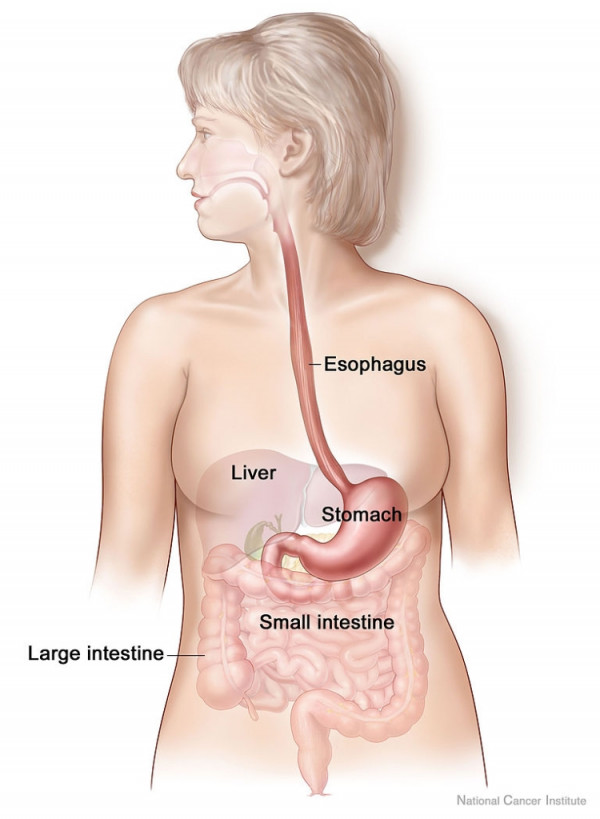Dysphagia
Difficulty swallowing
Key points about dysphagia
- People with dysphagia have problems swallowing certain solid foods or liquids, while others can’t swallow at all.
- See your healthcare provider as soon as possible if you develop problems swallowing.
- Dysphagia is a symptom that always needs to be explained and diagnosed correctly.
- There are various causes of dysphagia ranging from mild to serious.
- Treatment of dysphagia depends on what’s causing it.
- This page is about ongoing dysphagia. If you have an acute problem, with something blocking your throat so you can’t swallow at all, get help immediately!

Dysphagia means having trouble swallowing. It can be painful and sometimes makes swallowing hard or impossible.
When you swallow you use many muscles working together to move food or liquid from your mouth down your oesophagus (your food tube) and into your stomach. You have a small muscle flap (epiglottis) that covers up the opening into your trachea (windpipe) so that you don’t inhale your food as it goes down your throat. Once passed there, muscles in your oesophagus push the food down and a sphincter (muscular ring) at the top of your stomach opens to let food through.

Image credit: National Cancer Institute via Wikimedia Commons
The video below shows what happens when you swallow food.
Video: Dysphagia – what is swallowing?
If some of this complex process stops working properly you can have problems with swallowing. This is called dysphagia.
There are different types of dysphagia depending on where the swallowing problem is happening. It can be high up in your throat (oropharyngeal dysphagia), down to the bottom where your oesophagus meets your stomach (oesophagogastric dysphagia) or somewhere in between (oesophageal or paraesophageal dysphagia).
Symptoms of dysphagia include:
- pain while swallowing
- not being able to swallow
- coughing, gagging or choking when swallowing
- swallowing lots to try and clear food or drink
- feeling as if food is stuck in your throat, chest, or behind the breastbone
- dribbling or drooling saliva, fluids or food when eating and drinking
- hoarseness or a gurgly-sounding voice after swallowing
- food or stomach acid coming back up (regurgitation), sometimes through the nose
- frequent heartburn
- unplanned weight loss.
Globus, also called globus sensation or globus pharyngeus, is the feeling of having a lump in the throat when there is nothing there. This feeling can come and go and isn’t related to problems eating and drinking.
Although globus and dysphagia both feel like something’s stuck in your throat, they're different.
Dysphagia usually has a clear reason behind it, eg, muscle weakness or a blockage. Because of this, your healthcare provider is likely to need to take a closer look at your oesophagus (the tube connecting your mouth to your stomach) to figure out what's causing the issue.
Globus, on the other hand, doesn't have a clear cause. It's more like a sensation than a real blockage, and often goes away on its own.
Swallowing is complex and involves many muscles and nerves. There are many reasons why dysphagia can develop.
Neurological causes
These include:
- stroke
- brain tumours
- progressive disorders, eg, Parkinson’s, motor neurone disease
- head or brain injury.
Congenital and developmental conditions
These can include:
- cerebral palsy
- cleft lip and palate
- learning disabilities.
Narrowing or blockage
Some causes of narrowing or blockage include:
- cancer, eg, oesophageal cancer or mouth cancer
- radiotherapy treatment
- gastro-oesophageal reflux disease (GORD)
- infections, eg, tonsillitis, tuberculosis or oral thrush.
Other causes include:
- muscular conditions eg, scleroderma
- acid reflux
- ageing (as you age the muscles used for swallowing weaken)
- dementia
- head or neck surgery
- chronic obstructive pulmonary disease (COPD)
- swallowing large objects that get stuck (more common in children).
If you have difficulty swallowing solid food it usually means there’s an obstruction (something in the way) making swallowing difficult. Difficulty swallowing liquids, or both liquid and solids together, usually indicates there’s a neuromuscular cause, eg, with motor neurone disease, Parkinson’s or multiple sclerosis.
See your healthcare provider if you’re having difficulty swallowing. They’ll carry out an initial assessment to see if the issue is:
- in your mouth and throat – this is called oropharyngeal (high) dysphagia
- in your oesophagus (the tube to your stomach) – called oesophageal (low) dysphagia.
Depending on the suspected cause, they might refer you to a specialist for more tests and treatment. You may be referred to:
- an ear, nose and throat (ENT) specialist
- a neurologist – a specialist in conditions that affect the brain, nerves, and spinal cord
- a gastroenterologist – a specialist in treating conditions of the esophagus, stomach, and intestines
- a geriatrician – a specialist in the care of older people
- a speech and language therapist (SLT)
- a dietitian for assessment and nutritional advice.
Most swallowing problems associated with dysphagia can be treated. The exact treatment depends on where the problem is (whether its ‘high’ or ‘low’ dysphagia) and what's causing it. If there’s a health condition causing or contributing to the problem, treating that can also improve your swallowing.
Remember, the key is to see your healthcare provider so they can figure out the specific reason for your swallowing trouble and recommend the best treatment for you.
You may be referred to a dietitian who can help to change what you eat, how foods are prepared or for nutritional supplements if needed.
Here are some ways to reduce difficulties in swallowing when eating and drinking:
- sit up straight
- don’t tip your head back
- eat slowly
- take small mouthfuls and chew your food well before swallowing
- concentrate on what you’re doing
- don’t talk while eating or drinking
- cough if you need to clear your airway.
If you’re referred to a dietitian, they might give you advice about softer food and thickened fluids that are easier to swallow.
Apps reviewed by Healthify
You may find these Swallowing difficulty apps useful.
Difficulty swallowing can lead to the following:
- Coughing and choking: Food, drink or saliva going down the wrong way can block your airway and make it difficult to breathe
- Malnutrition and dehydration: Dysphagia can make it hard for you to get enough food and drink into your body
- Aspiration pneumonia: This is a chest infection that can develop after you’ve accidentally inhaled something and it’s caused irritation in your lungs.
If you have dysphagia, it may mean that you also have trouble swallowing any medicines that you need to take and this may cause further medical problems. Read more about medicines and swallowing difficulty.
| If you or someone you know is being treated for dysphagia and develops these symptoms call your healthcare provider or 111 if it’s an emergency. |
Dysphagia (swallowing problems)(external link) NHS, UK
Dysphagia (difficulty swallowing)(external link) Patient Info, UK
Apps
References
- Dysphagia (swallowing problems)(external link) NHS Inform, UK, 2023
- Dysphagia(external link) Mayo Clinic, US, 2023
- Dysphagia patient information Speech Language Therapy(external link) ORA Service, NZ, 2018
- Globus sensation(external link) Patient Info, UK, 2023
- Globus(external link) International Foundation for Gastrointestinal Disorders, US, 2024
- Dysphagia (difficulty swallowing)(external link) Patient Info, UK
Jardine M. Responsiveness to Māori in dysphagia research – beyond ‘kai’ (nutrition), ‘inu’ (hydration), and ‘te reo’ (Māori translation)(external link) Speech Lang Hear. 2023 Nov 06; online ahead of print
Difficulty swallowing – a guide to oesophageal causes and treatments(external link) NZ Doctor, 2018
Duncan S, Menclova A, Huckabee M-L. Estimating the incidence and prevalence of dysphagia in New Zealand(external link) Dysphagia 2024
Apps
Credits: Healthify editorial team. Healthify is brought to you by Health Navigator Charitable Trust
Reviewed by: Dr Art Nahill, Consultant General Physician and Clinical Educator
Last reviewed:





